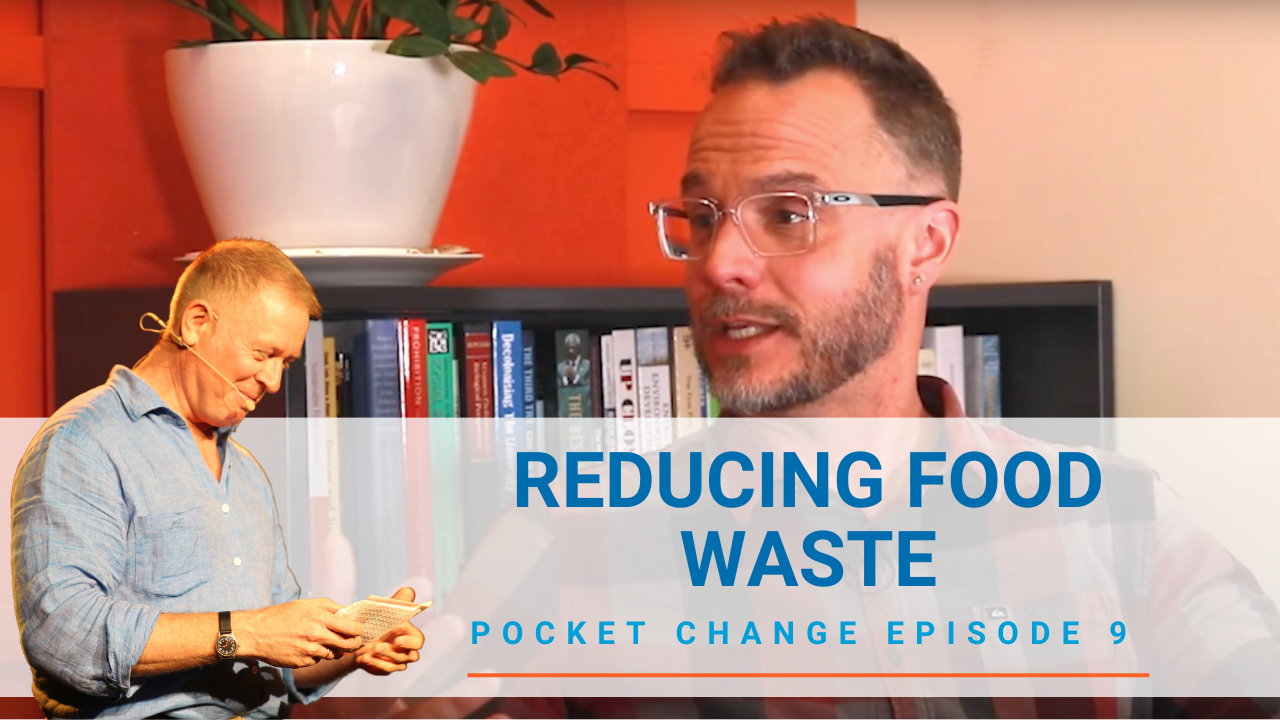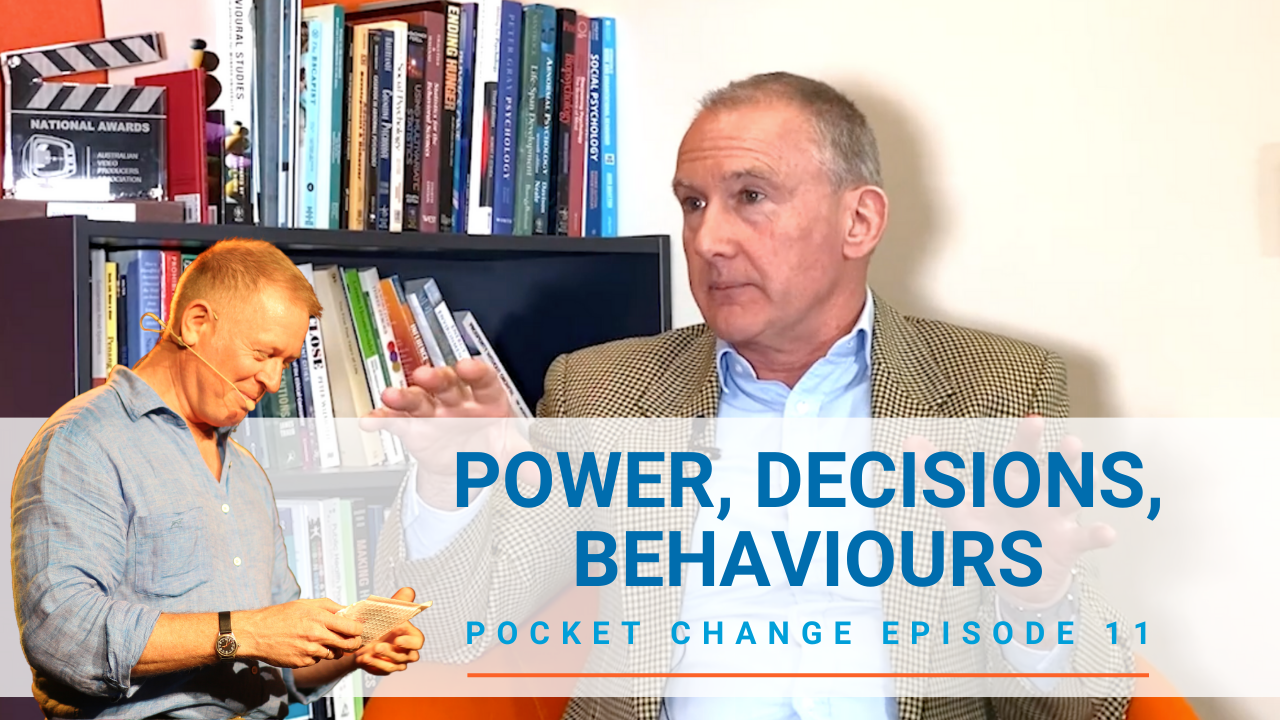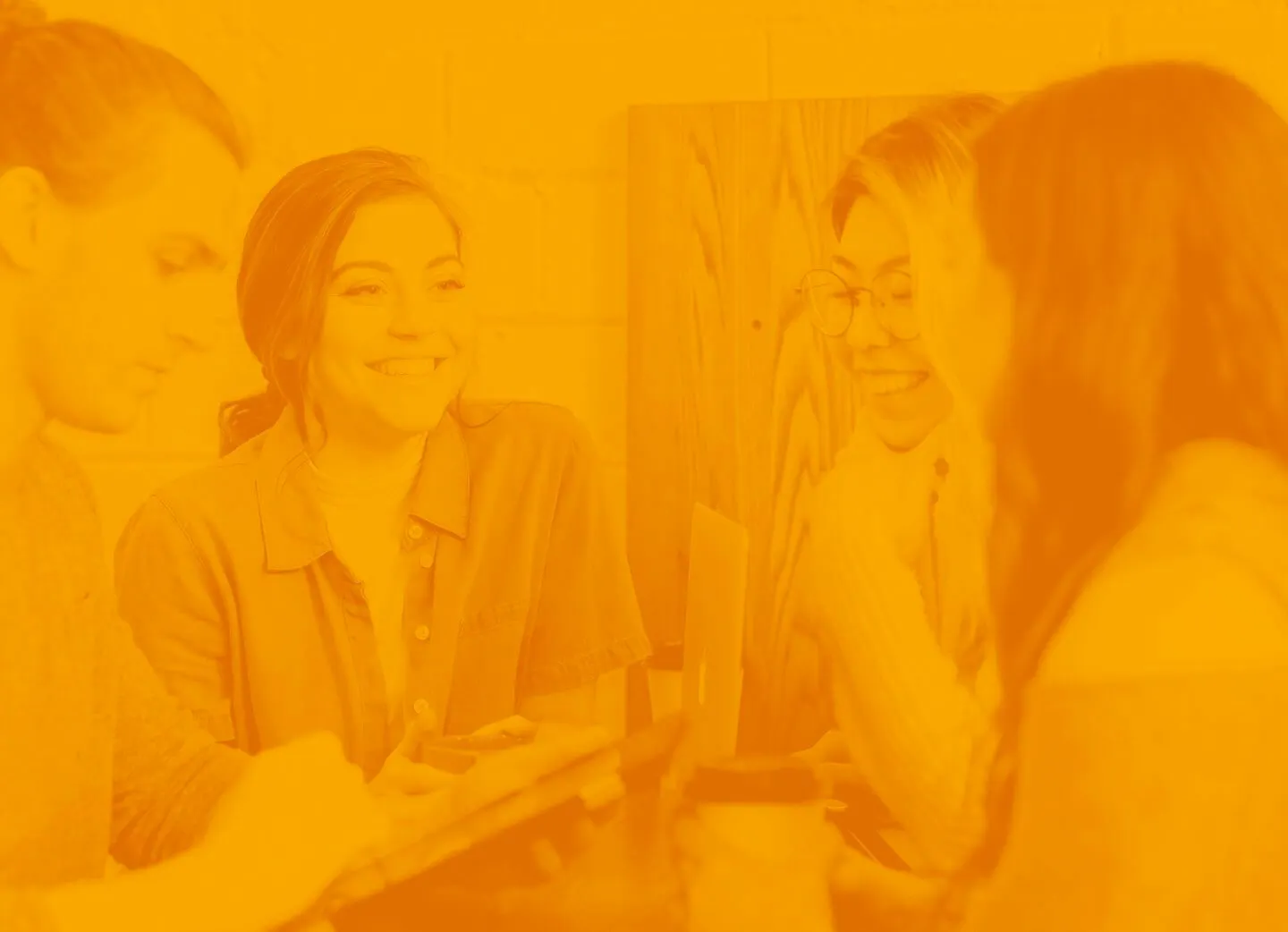


Opportunities to reduce food waste at home
Pocket Change Episode 9 with Dr Mark Boulet
We are producing more food than ever before. As global food systems become more interconnected, we are seeing an exponential increase in the availability of food to more communities around the world. However, we are also seeing more food wasted than ever before.
Speaking to Geoff Paine, Environment Portfolio Lead and food waste expert, Dr Mark Boulet, discusses his research to fighting food waste in households. According to Mark, as our food systems become more complex, it also becomes more vulnerable where food is at greater risk of getting wasted than ever before.
The way we interact with food in our homes presents a unique opportunity for us to manage the amount of food that goes to landfills, decreasing its role in generating greenhouse gas emissions. With 2.5 million tonnes of food being wasted from Australian households annually, reducing food waste in the home offers a significant opportunity to mitigate the these emissions.
One key insight to come from Mark's research is the impact of engaging and empowering young children to make their own decisions in prepare their own foods.
Grab a coffee, press play, and enjoy this episode of Pocket Change. How can we reduce food waste in households:
Pocket Change is a series of pocket-size videos about a key aspect of behaviour change. Each episode features a BehaviourWorks Australia Researcher explaining their area of expertise in a clear and simple manner.
Transcript:
GEOFF
Hi everyone. Geoff Paine here with Mark Boulet. Mark, introduce yourself.
MARK
Mark. I'm a research fellow at BehaviourWorks Australia in the Monash Sustainable Development Institute.
GEOFF
Basically, tell us what is so important about food waste in your research into this area.
MARK
Look, it's the food system overall as it has got more interconnected, more global, more I guess large scale. It's become increasingly vulnerable. So even though we have unparalleled rates of productivity across the system, we produce more and more every year. The food chain is so complex, so interconnected, it actually makes it even more vulnerable. So it's almost become across the chain easier for us to waste food.
You know, we have a conflict in one particular area, which means that wheat doesn't get to another area and then it spoils. We have, say, price rises in one area or a shift in demand, and it means that food that's grown in another area doesn't go to market. So because of the complexity within the system, we're actually at greater risk of wasting food than ever before.
And that's definitely then also reflected in the way that householders engage with food. So our lives have become so much busier and we it means that consumers are much less in control of their how much food that they end up wasting.
GEOFF
I've heard described as food from nowhere, which, you know, in other words, we go to the supermarket, we buy the food. It comes from nowhere. We use some of it, we throw it out. It goes somewhere that we disconnected from where the food comes from and where it goes to and is then another issue.
MARK
A lot of food waste seems to sort of emerge from the cracks, if you like, on our day to day behaviours. We end up going to the supermarket and we buy more than we've intended to. We end up cooking a meal for our family and we're not particularly good at portion control or we don't know who's going to be home for dinner.
So we end up cooking more than we need to. We serve up and one of our kids, you know, turns their nose up at the food, So we end up throwing that out. So it's more that food waste is that kind of death by a thousand cuts. And it emerges as a result of a whole bunch of things rather than sort of squarely blaming that we just don't know, you know, that cows make milk or where bread comes from, for example.
GEOFF
So what has your research, I mean, you've worked with schools, food waste in schools. What are some of the surprises or outcomes of your research?
MARK
So what what I'm really heartened by by the research is the opportune for change when it actually comes to reducing food waste in the home. So when you look at, say, resource consumption in homes more generally, there's a lot of things that are kind of locked in for us. You know, we don't have a lot of control over, say, the emissions that come from the electricity that we use or, you know, a house has gas locked into it.
So we're kind of a needing to say consume water and energy in ways that are on a sort of preset for us by the nature of the home that we live in. What delights me around food wise is the opportunities for change and the potential potential for change that can happen from us making some simple alterations to our day to day practices.
And that's really kind of empowering in a sense, because it means that if people are feeling, you know, frustrated about wanting to make a contribution, feeling nervous about sort of state of the world and the state of environment by reducing or changing their practices related to food waste, they can actually make some really important contributions to that.
GEOFF
Some of the research was showing that if parents and children prepare meals together, that impacts how they treat the food in terms of this waste.
MARK
Yeah, exactly. So, you know, one of the things around food waste within homes is it's not always up to one particular person. We tend to think it's about, you know, changing the behaviours of the person who is what we call the dietary gatekeeper. So the person is mainly responsible for shopping and cooking typically in Australia and actually probably in most countries does tend to be the mother.
I suspect that's shifting a little bit more. But yes, it is still the mother we tend to use the word dietary gatekeeper in a way is sort of hoping that that's probably going to be shifting more and more know in the future. But going back to that, the point of kids and parents. One of the things that we found, particularly for households that are family based household so that have children, children are actually one of the sort of reasons for households wasting food, because a lot of the activities of the person who's responsible for shopping and cooking is geared to meet the schedules, the appetites, the tastes, the preferences of their children. So, and it means that in a way that food is wasted despite Mum's best intentions. And so what we found in some of the work that we've been doing in schools is that if you get kids engaged and so that they're involved in making food to take to school, if they understand about the problem of food waste themselves, if there's a bunch of simple behaviours that children can do, it actually reduces the food waste that's coming from the household.
And it means that then in schools, there also tends to be less food waste as well, because kids either bring exactly what they need or tend to eat it all at school.
GEOFF
Where to next? What can we do now with research like yours to change our behaviours around food waste?
MARK
So where to next? I think there's a there's a real opportunity now for us to actually be testing some what we would call on the ground interventions within homes. My research has shown that we know about the kind of the main range of factors that lead to food waste, that influence the way that we waste food. We've got a pretty good handle on the sort of behaviours that are associated with increased amounts of food waste, as well as the behaviours that we should be doing, the ones that are associated with decreased amounts in food waste. So we're getting a good handle on that. And my PhD project was actually trying to kind of present a multi-level framework that captures all of that and presents it in a really sort of coherent way. Well, now there's an opportunity to actually test some of the ideas that emerge from what we know about food waste, to actually see what we can do within homes and within, say, for example, schools.
So I've been working with a food rescue organisation, a National Food Rescue Organisation, OzHarvest, who are trialing, for example, the use of what they call a 'use it up' tape and use it up tape, basically, the idea is very simple. It serves as a visual prompt where you tape off an area in your fridge or your pantry where you place items that need to be used up before you go shopping again.
Or you can just label individual containers of food. And it just serves as a reminder for when people open the fridge; Oh yeah, I better use that up before I go shopping. We've been testing that in the field and we found that people that have used the tape over a two week period have reported a 40% reduction in food waste, primarily in the amount of fresh fruit and vegetables they waste, as well as the amount of meat and yogurt.
So a lot less fresh, easily spoiled of all items. That tape has allowed them to have greater control over the spoilage for items need to be used up. So I think it just shows there is a huge opportunity to continue to test these kind of innovative yet simple ideas because the impacts are actually really, really profound. And when you think food waste accounts for 10% of global emissions, it's a really great way to actually reduce, you know, climate change,
GEOFF
Especially in a world exactly with climate change and global supply chains being disrupted through political war events, climate change events. Yeah.
MARK
So the other point that, you know, we need to be mindful of here where some of the opportunities are for us to to change the way that we do things is that there's a really big focus within the food waste management at the moment, which is on, I guess, green disposal. So we provide people with compost bins and when farms or increasingly councils are rolling out these FOGO bins, you know, food and organic, I think the issue that we need to be really careful of is that those particular ways of managing waste can actually provide people with what we call a moral license to waste more food. So it's like if I've cooked too much or bought too much or it'll go on the Fogo bin or go to my compost or whatever. But the point is the food, which at some stage could have been eaten and it's, you know, kind of accompanying environmental rucksack of the amount of energy and water and stuff that went into it, that is still wasted there. So Fogo is great for your inedibles, right? Your scraps, your skins, your bones, all those things. But what we should still make sure that we do is engage in those behavioural practices that actually reduce the amount of avoidable food waste overall, rather than just think to ourselves, it's fine. It's going to be taken care of and go to a composter because the environmental impact has still happened because, you know, we've wasted food, which we which water was used to grow and energy was used to grow and so forth.
GEOFF
And your research has shown most families agree food waste is bad. It's a bad thing. We want to get on board and stop it. It's just changing the systems around daily routines of making lunch, sending the kids off to school, or that sort of stuff.
MARK
Exactly.
GEOFF
All right. So what would be a couple of key kind of takeaways that we should do?
MARK
So so the sort of thing that we keep coming back to time and again in terms of, I guess, capturing what it is that people can do, you know, and it's kind of it's in three specific areas when it comes to food, right? If you're at the bin with a plate is for food, it's too late. Right. So a lot of the changes happen before that.
So the first is shop what you need. So let's be clear on what you don't have in your house that you need and do a shopping list. The other is cook with what you have and also cook for who's there. Yeah. So don't cook more than you need. Well, we all love leftovers, but the reality for a lot of leftovers is that they just end up being put in Tupperware, they put in the back of the fridge or in the freezer and they spoil so we don't end up using them. And then eat what you have. So again, making sure that we're actually using the products that are in our homes before we go out and buy. So cook to who's there and eat what you have rather than continue to sort of, I guess, push stuff back to your fridge and then keep buying more things to put on top of that as well.
GEOFF
Mark Boulet, thank you so much.
MARK
Thanks.









